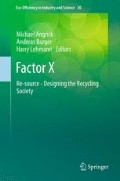Abstract
Economic growth goes hand in hand with resource use growth – a correlation that seems inescapable for all of humanity. These dynamics are explored in this chapter using oil as an example. In specific regions relative decoupling has proven possible, that is, to slow the rate of resource use growth to the point where it is lower than the economic growth rate. So far, however, there are no signs that absolute decoupling, that is, economic growth without additional resource use, will take hold at any time in the foreseeable future on the global level, as the quickening pace of climate change, as well as the recent energy crisis, clearly shows. Financial markets play an ambivalent role in that they promote short-term orientation on economic growth and contribute to bubbles of raw-material prices, but it is exactly their excesses that draw attention to resource scarcity. In a finite world, resource availability will inevitably run up against absolute limits, which in turn entail absolute decoupling of economic growth from resource use, so to say a dematerialization of economic growth. The energy revolution called for by the IEA illustrates the unprecedented resource productivity increase and technological strides that would be necessary to achieve the aforementioned goals. The fact that such efficiency strategies could potentially fail calls into question the viability of the economic growth paradigm.
This chapter contains the author’s personal views and does not necessarily reflect those of Oesterreichische Nationalbank.
Access this chapter
Tax calculation will be finalised at checkout
Purchases are for personal use only
Notes
- 1.
Thus, increasing demand can only be met by additional natural-gas liquids and unconventional crude oil.
References
Acemoglu D, Aghion P, Bursztyn L, Hemous D (2010) The environment and directed technical change. FEEM working paper no. 93
Aiginger K, Tichy G, Walterskirchen E (2006) WIFO-Weißbuch: Mehr Beschäftigung durch Wachstum auf Basis von Innovation und Qualifikation. Wien
Bourcarde K, Herzmann K (2006) Normalfall exponentielles Wachstum? – ein internationaler Vergleich. Zeitschrift für Wachstumsstudien 2/2006, pp 4–10
Breitenfellner A, Crespo Cuaresma J (2008) Crude oil prices and the USD/EUR exchange rate. Monet Policy Econ Q4/08:102–121
Breitenfellner A, Crespo Cuaresma J, Keppel C (2009) Determinants of crude oil prices: supply, demand, cartel or speculation? Monet Policy Econ Q4/09, OeNB:111–136
Brock W, Taylor MS (2005) Economic growth and the environment: a review of theory and empirics. In: Durlauf S, Aghion P (eds) The handbook of economic growth. North Holland, Amsterdam
Energy Watch Group (2008) Zukunft der weltweiten Erdölversorgung. Überarbeitete, deutschsprachige Ausgabe, May
European Commission (2010) Europe 2020. A European strategy for smart, sustainable and inclusive growth
Gaggl P, Janger J (2009) Will the great recession lead to a lasting impact on potential output in Austria? (729 KB) Monet Policy Econ Q3/09:26–52
International Energy Agency (2008) IEA work for the G8 – 2008 messages. IEA, Paris
International Energy Agency (2010) World energy outlook 2008. IEA, Paris
Krugman P (2008) The oil nonbubble. New York Times, 12 May
Liedtke C, Kaiser C (2007) “Das Stichwort der Zukunft: Ressourcenproduktivität.” Jahrbuch Ökologie
Maddison A (2001) The world economy: a millennial perspective. OECD, Paris
Matthies M (2002) Einführung in die Systemwissenschaft – WS 2002/2003. Skriptum
Meadows D, Randers J, Meadows D (2006) Grenzen des Wachstums – Das 30-Jahre-Update. Stuttgart
Mitchell D (2008) A note on rising food prices. The World Bank, Washington, DC. Working paper 4682
Weizsäcker EUv, Lovins AB, Lovins LH (1995) Faktor Vier. Doppelter Wohlstand, halbierter Naturverbrauch. Droemer Knaur, München
Author information
Authors and Affiliations
Corresponding author
Editor information
Editors and Affiliations
Rights and permissions
Copyright information
© 2013 Springer Science+Business Media Dordrecht
About this chapter
Cite this chapter
Breitenfellner, A. (2013). Economic Growth and Resource Use. In: Angrick, M., Burger, A., Lehmann, H. (eds) Factor X. Eco-Efficiency in Industry and Science, vol 30. Springer, Dordrecht. https://doi.org/10.1007/978-94-007-5712-7_4
Download citation
DOI: https://doi.org/10.1007/978-94-007-5712-7_4
Published:
Publisher Name: Springer, Dordrecht
Print ISBN: 978-94-007-5711-0
Online ISBN: 978-94-007-5712-7
eBook Packages: Earth and Environmental ScienceEarth and Environmental Science (R0)

